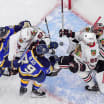The Coaches Room is a regular feature throughout the 2021-22 season by former NHL coaches and assistants who will turn their critical gaze to the game and explain it through the lens of a teacher. Rocky Thompson and Dave Barr will take turns providing insight.
In this edition, Thompson, who was an assistant with the Edmonton Oilers in 2014-15 and an associate with the San Jose Sharks in 2020-21, takes a closer look at how NHL coaches are likely to be preparing for the Stanley Cup Playoffs, which begin Monday.
Focus on final week of season crucial before start of playoffs
Preparations for next game, subtle adjustments part of transition to first round

© Mike Ehrmann/Getty Images
By
Rocky Thompson
Special to NHL.com
What's going on in an NHL coach's office this week, and in the dressing and meeting rooms of the 16 teams that will qualify for the Stanley Cup Playoffs?
Without schedules and agendas and itineraries, I can't nail it down for you to the minute but having played and coached and knowing as many coaches as I do, let me outline for you how this goes if I were the one in charge.
Fourteen teams already know they're in and all the matchups will be determined by Friday night, if not before. So many teams have already begun their preparation processes for first-round playoff series.
Each team's scenario will be slightly different, depending on how quickly they will know their opponent and how the schedule for Game 1s is sorted out.
Still, there are a few regular-season games to play and me, I'd be focused all this week on my opponents and preparations for games this week. I never want to look beyond the next game we're playing. That's a personal thing and I want to have the best preparation possible for each game.
I suppose the one exception could be if I knew my opponent well ahead of time, like the Minnesota Wild and St. Louis Blues do in the Central Division.
In that case, I might be adjusting a thing or two without the players knowing specifically. I don't want their attention diverted. By that I mean, let's suppose I wanted to make a slight adjustment to our forecheck that we've identified. So we've got two different regular-season opponents this week and I would implement the change knowing this is almost like practice for the upcoming series that's still a week away. But I wouldn't be burdening the players with that background, and it would give us some reps on that adjustment. But you'd never want to change too much, likely only subtle adjustments that could yield some dividends in a series ahead.
Once my place is assured in the playoffs, I'll still be preparing for my next regular-season opponent, but I could divert some of my attention to our potential playoff opponent or opponents for the first round. Most teams in this spot have a strong idea that it's going to be down to two or three opponents, so I would have my video coach start clipping some of those teams' games, looking for valuable video clips when the opposition was either us, how we played them, or other teams that had success against our playoff opponent.
If we had a tough time against our playoff opponent, I'd want to see what teams did that didn't have a tough time against them, to see if there's any kind of thing we could exploit.
It's of great importance how we've played our opposition during the regular season and specifically if that game or games were played recently. I wouldn't look too far into the past on those games. I'd still look at them and our prescouts but I want to apply all of it to more recent games and games our opposition played, including teams they had trouble with and had success against.
Once we know for certain who we'll be playing, that's when I can start to focus on the structure of the team we'll be up against and I'd be going through our video prescouts of those previous games. And I wouldn't say that's difficult, because by this time of the season, you really do know most of the players very well.
Once we know the playoff opponent, the delegation would begin, with special teams information going to the assistants and I would focus on 5-on-5 play and information on individual opposition players. We'd meet as a staff and go over all that material and come out with a plan on how we'll present it to our players.
If our team's Game 1 is Monday, I'm finalizing my plan the morning after our last regular-season game. That's Saturday for most teams and for the players, it would likely be a day off the ice, a rest day, or a travel day to help give them a break and a chance to clear their minds and refocus for the next journey.
We would present opposition's team personnel, not systems and structure, but individual tendencies and weaknesses to get that off our plate Saturday. The staff will also finalize our structural prescout emphasis. On Sunday I would try not to overload the players, but we would have to do the 5-on-5 and special teams presentations. It would be more condensed so that we don't overwhelm them with too much information. We may potentially practice certain things like a power-play breakout, for example, that we thought would be a good and useful adjustment we were making.
If I have the extra day, opening my series Tuesday, Saturday will be off for the players for maintenance and rest, physically and mentally, then our 5-on-5 prescout and information on opposition personnel comes Sunday. And we'd have a short, fast practice that would include power play even though the players have not seen the special teams prescout yet. Then we'd present the special teams Monday, spread all the material out over two days for the players, maybe have a run-through on the ice to get some continued reps and to get familiar with the opposition on special teams.
I want to emphasize this: I'm very aware of not overloading the players with information. Without a doubt there's risk of too much information, especially about opponents, distracting you from what makes you successful as a team and as an individual. It can be a worry if you don't have a clear focus on our own game and how we need to play.
Me, I want every piece of information. I'll be the one overloaded. That's not going to burden me in any way. It just prepares me. I'll know the potential adjustments we may make but I'm not sharing those with my players up front. I'm prepared for those things, top to bottom, and there will be no surprises for me or my staff on what the opposition may do. The players are on a need-to-know basis. That's a big Bill Walsh thing, the coach being prepared for all scenarios and the players being prepared with what they need to know. It's a lot of work, but that preparation is valuable to me.
On the overall preparation, I should stress that there are no long meetings with the players. They want the information, but it can't be a prolonged or laborious meeting. The message has to be that your personal game, how you play, should be solidified, and then the prescout can bring a few things to light but the emphasis should be encouraging your style of play and how that will be effective and successful.
Then the day of the game with all the preparations being done, it's mostly a normal game-day routine, a few bullet points, a few video clips for reminders on some high-value points and we have an optional pregame skate. At this point of the season, pregame skates are optional so it's whatever the individual player needs to do to be ready. They have the freedom to prepare accordingly.
And then the puck drops for Game 1. Let the marathon to the Stanley Cup begin.

















